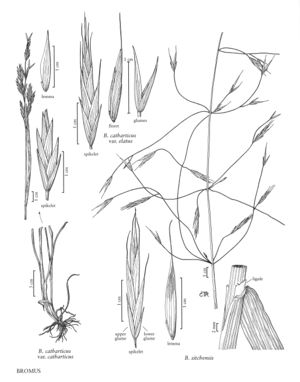Difference between revisions of "Bromus catharticus var. catharticus"
FNA>Volume Importer |
imported>Volume Importer |
||
| (3 intermediate revisions by 2 users not shown) | |||
| Line 36: | Line 36: | ||
|publication year= | |publication year= | ||
|special status= | |special status= | ||
| − | |source xml=https:// | + | |source xml=https://bitbucket.org/aafc-mbb/fna-data-curation/src/200273ad09963decb8fc72550212de541d86569d/coarse_grained_fna_xml/V24/V24_274.xml |
|subfamily=Poaceae subfam. Pooideae | |subfamily=Poaceae subfam. Pooideae | ||
|tribe=Poaceae tribe Bromeae | |tribe=Poaceae tribe Bromeae | ||
Latest revision as of 16:22, 11 May 2021
Plants annual or biennial; tufted. Culms 30-120 cm, erect or decumbent. Sheaths usually densely, often retrorsely, hairy, hairs sometimes confined to the throat; ligules 1-4 mm, glabrous or pilose, erose; blades 4-26 cm long, 3-10 mm wide, glabrous or hairy on both surfaces. Panicles 9-28 cm, open, erect or nodding; lower branches 1-4 per node, spreading or ascending, with 1-5 spikelets. Spikelets 20-30 mm, with 6-12 florets. Lower glumes 5-7-veined; upper glumes 9-13 mm, (7)9(11)-veined; lemmas 11-20 mm, glabrous or scabrous, sometimes pubescent distally, (9)11-13-veined; awns absent or to 3.5 mm; anthers about 0.5 mm in cleistogamous florets, 2-4 mm in chasmogamous florets. 2n = 42.
Discussion
Bromus catharticus var. catharticus is native to South America. It has been widely introduced in the flora region as a forage crop and is now established, particularly in the southern half of the United States. It usually grows on disturbed soils.
Selected References
None.
